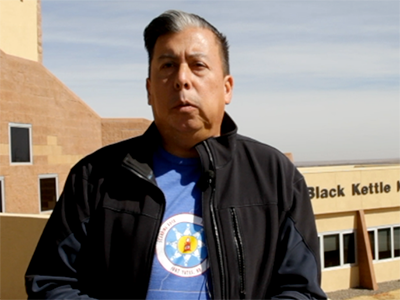United Methodists from around the connection immersed themselves in Native American culture this week during a special event hosted by the Oklahoma Indian Missionary Conference.
The one-of-kind immersion experience, held in March, aimed to educate participants and build awareness about Native Americans in The United Methodist Church.
Twenty-three participants visited Native churches, communities and historical sites that have influenced ministry in the conference.
When you give generously on Native American Ministries Sunday, you support annual conferences like the Oklahoma Indian Missionary Conference to help empower congregations to find fresh, new ways to minister to the Native American communities with Christ’s love.
“The experience of meeting people face-to-face and listening to Native peoples’ stories has a tremendous effect on the outlook of participants and helps them understand who we are as Native people and the importance of our presence in The United Methodist Church,” said the Rev. David Wilson, Oklahoma Indian Missionary Conference superintendent.
 |
| The Rev. David Wilson, superintendent of the Oklahoma Indian Missionary Conference. Video image. |
Wilson said he was encouraged to create the immersion opportunity based on the results of a study by United Methodist Women that found people wanted to know more about the missionary conference. The “Act of Repentance Toward Healing Relationships with Indigenous People” held during the 2012 General Conference also sparked an increased interest in Native ministries.
“The wonderful piece about the Acts of Repentance is that there are many who are still actively pursuing what that means to The United Methodist Church,” said Wilson, adding he was surprised to have participants from Texas, New Jersey, Arizona, Nebraska and New York attend the event.
The immersion experience included a trip to Cheyenne, Oklahoma, and the site of the Washita Battlefield, also known as the Washita Massacre.
The visit is a continuation of the story shared at the 2012 General Conference, which focused on the 1864 Sand Creek Massacre led by Col. John Chivington, a Methodist minister. Chivington’s cavalry attacked and destroyed a Cheyenne and Arapaho encampment, killing 160 people, mostly women, children and the elderly.
“This was a massacre, a genocide,” said Jonathan Campbell from the Greater New Jersey Conference, who participated in the immersion event. He said he hopes the church will learn a lesson from Black Kettle about making peace.
The 1.5-mile walking tour of the Washita Massacre site included a stop at the Black Kettle Memorial Tree, where participants tied prayer ribbons honoring the memory of those who died.
“It was emotional to remember the history and the people who died,” said Glenda Hill from the Desert Southwest Conference. “The culture that they come from still continues today. It’s 150 years later and, thankfully, we are still honoring that culture.”
The participants finished the day by visiting the Clinton Indian Church and Community Center, where they fellowshipped and made crafts with the help of Cheyenne and Arapaho children.
“It’s amazing people have taken time out of their schedules to want to come, learn and expose themselves to Native cultures,” said Wilson. “We are thankful folks have had a great experience.”
Ginny Underwood, freelance writer and communication consultant, Oklahoma Indian Missionary Conference.
One of six churchwide Special Sundays with offerings of The United Methodist Church, Native American Ministries Sunday serves to remind United Methodists of the gifts and contributions made by Native Americans to our society. The special offering supports Native American outreach within annual conferences and across the United States and provides seminary scholarships for Native Americans.
When you give generously on Native American Ministries Sunday, you equip seminary students who will honor and celebrate Native American culture in their ministries. You empower congregations to find fresh, new ways to minister to their communities with Christ’s love. Give now.





